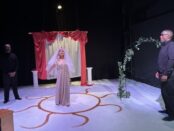Deffaa comments: “I've always loved Cohan's attitude--that 'can-do' spirit of his is inspiring. He had no formal education; he learned by doing; and left a terrific legacy. Just a remarkable man! No one in Broadway history ever did as many different things as well as Cohan. He wrote book, music, and lyrics for Broadway shows that he starred in, directed, choreographed, and co-produced. He wrote or co-wrote some 50 Broadway shows, produced or co-produced some 80 Broadway shows. At his peak, he owned or controlled seven Broadway theaters. “Cohan’s shows--fast, funny, and unusually well-plotted for their day--laid the foundation for modern musical comedy. It was Cohan who made America--not Europe--the pace-setter for musical theater. In an era when musicals were often little more than collected vaudeville acts, Cohan was creating well-plotted musical plays. And critics took note that he was advancing the artform. George Jean Nathan, a top critic, wrote that Cohan’s musicals were “as carefully plotted as the dramas of Euripides.” By writing book, music, and lyrics, and supervising all aspects of production, Cohan was creating musicals far more cohesive than those before. And the best younger people working in the theater, like Oscar Hammerstein and Irving Berlin, took note and built upon Cohan’s foundation. Cohan was a major contributor to our culture. He was the first member of his profession honored with a Congressional medal, presented to him by President Franklin D. Roosevelt.”
[more]









